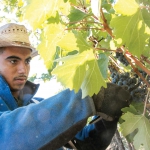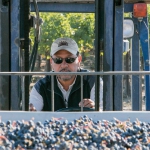Julia Kock, general manager at Klipsun Vineyards in Benton City, Washington, is passionate about two things—growing the best grapes possible and worker education.
She believes educated workers help her produce high-quality fruit, thus, she regularly sends employees to educational programs offered by the state’s wine industry.
Kock, and Klipsun Vineyards’ owners David and Patricia Gelles, are big proponents of education in the vineyard. They want their workers to understand the “why” behind the vineyard tasks. About 90 percent of Klipsun’s regular work force of around 20 has attended an educational program tailored to the wine industry’s Spanish-speaking workers. Programs include summer tailgate meetings discussing grapevine leafroll and red blotch diseases, day-long Spanish sessions at statewide wine grape conventions, and a six-month certificated class developed for Latino viticulture workers.
Twelve Klipsun employees graduated from or are attending the Latino Agricultural Education Program for Viticulture, a program sponsored by the Washington Association of Wine Grape Growers and hosted by Yakima Valley Community College.
The program is coordinated through the Hispanic Orchard Employee Education Program and taught by Leo Garcia and Francisco Sarmiento of Wenatchee Valley College. Since the viticulture program’s inception in 2006, it has expanded to three levels.
Klipsun also hires interns from Washington State University’s viticulture and enology four-year degree program. Kock was in the first graduating class of WSU’s viticulture and enology program in 2004.
Kock encourages employees to participate in educational programs by paying workers their wages when they attend the various classes and events. For the Latino viticulture program, that means paying them to attend lectures in Grandview every Friday from November through April. It’s a commitment of both the employer and employee. Klipsun is sending its first female employee to this year’s program.
Klipsun Vineyards has always placed emphasis on education, even before a recent study projected that up to 2,800 more vineyard workers with less than a two-year degree could be needed in Washington’s wine grape industry through 2018.
Washington’s wine industry is steadily growing. Wine grape acreage has increased by an average of 5 percent annually in the last decade and the number of wineries by 12 percent. Industry officials project statewide acreage will be near 65,000 acres by 2018, up from around 45,000 acres reported in a 2011 grower survey.
Change in culture
One of the benefits of Klipsun’s educational emphasis has been a change in the vineyard culture, Kock says.
“I now have lots of sets of eyes in the vineyard that can recognize pest and disease symptoms,” she said. “If they see things like plugged drip emitters, they now tell someone, and they know it’ll be taken care of.”
Several workers have attended clean plant and disease sessions and now understand the importance of reporting suspicious-looking leaves, she said. “Some have learned English, and with the newly published Spanish language Field Guide to Integrated Pest Management, we have a tool that can be used by all employees.”
Marcos Zambrano is an example of the employee mindset at Klipsun. Zambrano, 23, has been at Klipsun the last four years. He has a high school diploma but wants to learn more about grapes and is in his second year of the Latino viticulture program.
“I’m really interested in agriculture and grapes,” he told Good Fruit Grower. “After finishing the program last year, I understood more about soils, the plants, and how to spot virus on leaves. I’m more confident in my work because I understand things better.”
Zambrano has goals of becoming a crew supervisor and someday, perhaps, own a vineyard.
Roy Garcia, vineyard supervisor at Klipsun, worked in the tree fruit industry before joining Klipsun. He graduated from the Hispanic Orchard Employee program many years ago while working for Yakima Valley orchardist Chuck Peters.
“One of the reasons I hired him was because he had gone through the Hispanic Orchard Employee Education program,” said Kock. “I didn’t want a vineyard supervisor that wasn’t supportive of worker education because it does take guys and gals out of the vineyard to go to class.”
Garcia, who never received a high school diploma, has worked in the grape and tree fruit industry for 33 years. “The program helped improve my English, reading, and writing, and move me to a supervisor position,” he said.
He continues to take night classes on his own in preparation for passing the GED (general equivalency diploma) test. •








Leave A Comment